经济学原理英文版第一章PPT
- 格式:pdf
- 大小:1.14 MB
- 文档页数:36
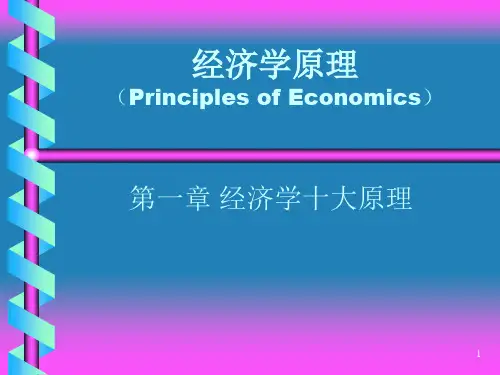
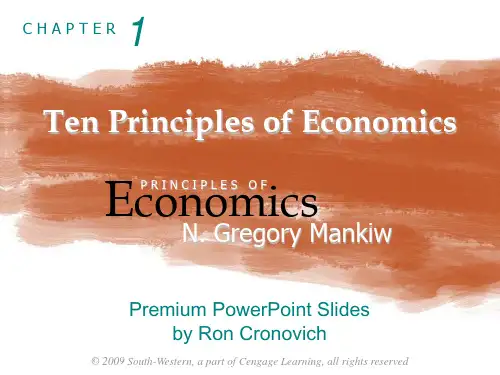
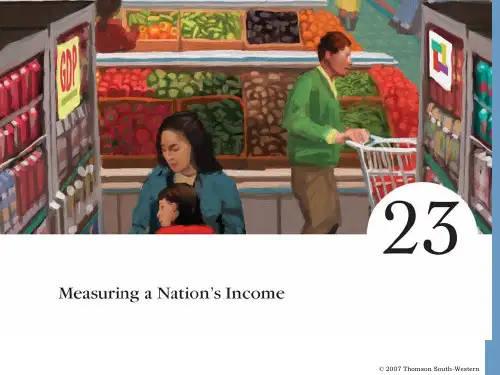
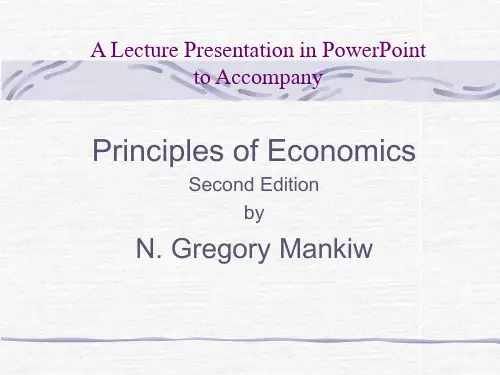
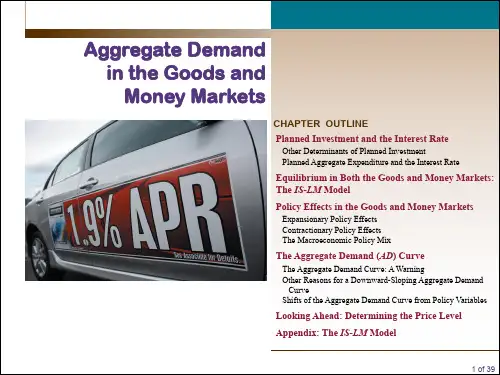
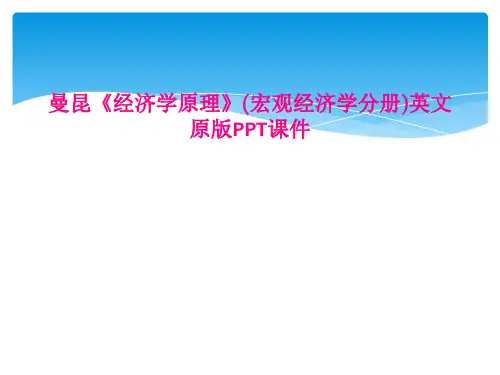
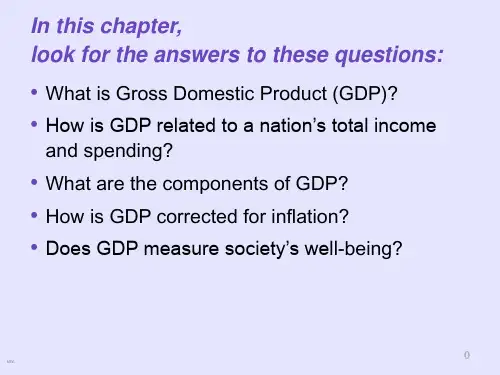
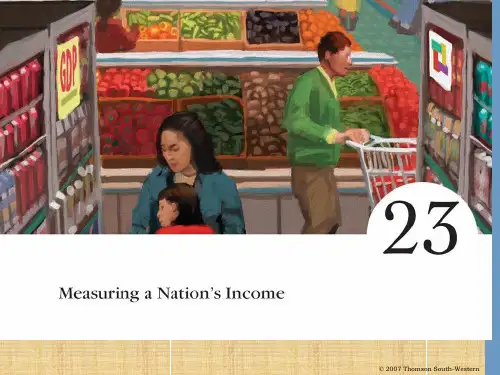
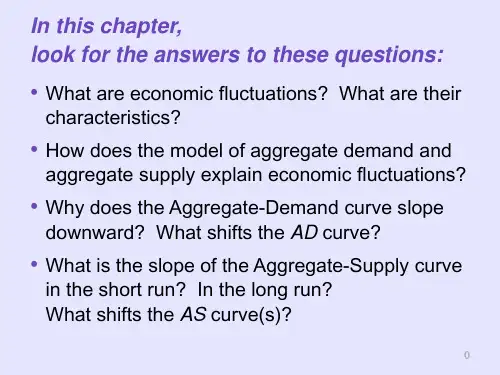
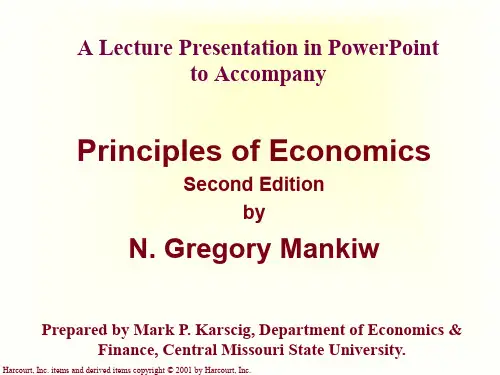
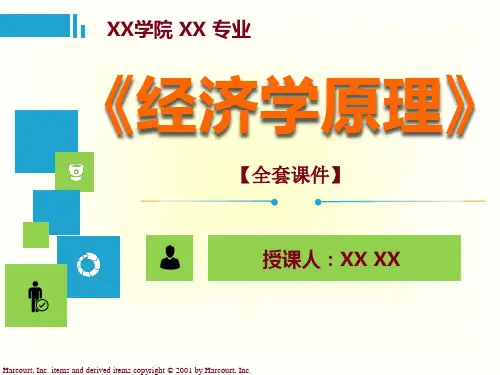
13FINAL THOUGHTS36Five Debates OverMacroeconomicPolicyFive Debates over MacroeconomicPolicy1.Should monetary and fiscal policymakers try tostabilize the economy?2.Should monetary policy be made by rule ratherthan by discretion?than by discretion?3.Should the central bank aim for zero inflation?4.Should the government balance its budget?5.Should the tax laws be reformed to encourage saving?1Should monetary and fiscal 1.Should monetary and fiscalpolicymakers try to stabilize the economy?Pro: Policymakers should try tostabilize the economy•The economy is inherently unstable, and left on its own will fluctuate.•Policy can manage aggregate demand in order to offset this inherent instability and reduce the to offset this inherent instability and reduce the severity of economic fluctuations.Pro: Policymakers should try tostabilize the economy •There is no reason for society to suffer through the booms and busts of the business cycle.•Monetary and fiscal policy can stabilize aggregate demand and,thereby,production and aggregate demand and, thereby, production and employment.Con: Policymakers should not try to stabilize the economy •Monetary policy affects the economy with long and unpredictable lags between the need to act and the time that it takes for these policies to work.•Many studies indicate that changes in monetary policy have little effect on aggregate demand until about six months after the change is made.Con: Policymakers should not try to stabilize the economy •Fiscal policy works wi th a lag because of the long political process that governs changes in spending and taxes.•It can take years to propose,pass,andIt can take years to propose, pass, and implement a major change in fiscal policy.Con: Policymakers should not try to stabilize the economy•All too often policymakers can inadvertently exacerbate rather than mitigate the magnitude of economic fluctuations.•It might be desirable if policy makers couldPro: Monetary policy should bemade by rule •Discretionary monetary policy c an suffer fromincompetence and abuse of power.•To the extent that central bankers allythemselves with politicians,discretionary themselves with politicians, discretionarypolicy can lead to economic fluctuations thatreflect the electoral calendar—the politicalbusiness cycle.Pro: Monetary policy should bemade by rule•There may be a discrepancy between what policymakers say they will do and what they actually do—called time inconsistency of policy.p y•Because policymakers are so often time inconsist ent, people are skeptical when central bankers announce their intentions to reduce the rate of inflation.Pro: Monetary policy should bemade by rule •Committing the Fed to a moderate and steady growth of the money supply would limit incompetence, abuse of power, and time inconsistency.y Con: Monetary policy should not bemade by rule•An important advantage of discretionary monetary policy is its flexibility.•Inflexible policies will limit the ability of policymakers to respond to changing economic policymakers to respond to changing economic circumstances.Con: Monetary policy should not bemade by rule•The alleged problems with discretion and abuseof power are largely hypothetical.•Also, the importance of the political businesscycle is far from clear.cycle is far from clear.3.Should the central bank aim for zeroinflation?Pro: The central bank should aim forzero inflation•Inflation confers no benefit to society, but it imposes several real costs.•Shoeleather costs•Menu costs•Increased variabil ity of relative prices•Unintended changes in tax liabilities•Confusion and inconvenience•Arbitrary redistribution of wealth Pro: The central bank should aim forzero inflation•Reducing inflation is a policy with temporary costs and permanent benefits.•Once the disinflationary recession is over, the benefits of zero inflation would persist. benefits of zero inflation would persist.Con: The central bank should notaim for zero inflation•Zero inflation is probably unattainable, and toget there involves output, unemployment, andsocial costs that are too high.•Policymakers can reduce many of the costs ofPolicymakers can reduce many of the costs ofinflation without actually reducing inflation. 4.Should fiscal policymakers reducethe government debt?Pro: The government shouldbalance its budget •Budget deficits impose an unjustifiable burden on future generations by raising their taxes and lowering their incomes.•When the debts and accumulated interest come When the debts and accumulated interest come due, future taxpayers will face a difficult choice:•They can pay higher taxes, enjoy less governmentspending, or both.Pro: The government shouldbalance its budget•By shifting the cost of current government benefits to future generations, there is a bias against future taxpayers.•Deficits reduce national saving,leading to a Deficits reduce national saving, leading to a smaller stock of capital, which reduces productivity and growth.Con: The government should notbalance its budget•The problem with th e deficit is often exaggerated.•The transfer of debt to the future may be justified because some government purchases justified because some government purchases produce benefits well into the future.Con: The government should notbalance its budget•The government debt can continue to rise because population growth and technological progress increase the nation’s ability to pay the interest on the debt.5.Should the tax laws be reformed to encourage saving?Pro: Tax laws should be reformed toencourage saving•A nation’s saving rate is a key determinant of its long-run economic prosperity.•A nation’s productive capability is determined largely by how much it saves and invests for the largely by how much it saves and invests for the future.•When the savin g rate is higher, more resources are available for investment in new plant and equipment.Pro: Tax laws should be reformed toencourage saving•The U.S. tax system discourages saving in many ways, such as by heavily taxing the income from capital and by reducing benefits for those who have accumulated wealth.Pro: Tax laws should be reformed toencourage saving•The consequences of high capital income tax policies are reduced saving, reduced capital accumulation, lower labor productivity, and reduced economic growth.gPro: Tax laws should be reformed toencourage saving•An alternative to current tax policies advocated by many economists is a consumption taxconsumption tax.•With a consumption tax, a household pays taxes based on what it spends not on what it earns. based on what it spends not on what it earns.•Income that is saved is exempt from taxation untilthe saving is later withdrawn and spent onconsumption goods.Con: Tax laws should not bereformed to encourage saving •Many of the changes in tax la ws to stimulate saving would primarily benefit the wealthy.•High-income households save a higher fraction of their income than low-income households.•Any tax change that favors people who save willalso tend to favor people with high incomes.2009-11-1 C on: Tax laws should not be reformed to encourage saving • Reducing the tax burden on the wealthy would lead to a less egalitarian society. • This would also force the government to raise the tax burden on the poor. Con: Tax laws should not be reformed to e ncourage saving • Raising public saving by eliminating the government’s budget deficit would provide a more direct and equitable way to increase national saving.g Summary • Advocates of active monetary and fiscal policy view the economy as inherently unst able and believe policy can be used to offset this inherent instability. y • Critics of active policy emphasize that policy affects the economy with a lag and our ability to forecast future economic conditions is poor, both of which can lead to policybein g destabilizing. Summary • Advocates of rules for monetary policy argue that discretionary policy can suffer from incompetence, abuse of power, and time inconsistency. y • Critics of rules for monetary policy argue that discretionary policy is more flexibl e in responding to economic circumstances. Summary • Advocates of a zero-inflation target emphasize that inflation has many costs and few if any benefits. zero-inflation • Critics of a zero inflation target claim that moderate inflation imposes only small costs on society, whereas the recession necessary to reduce inflation is quite costly. Summary • Advocates of reducing the government debt argue that the debt imposes a burden on future generations by raising their taxes and lowering their incomes. • Criti cs of reducing the government debt argue that the debt is only one small piece of fiscal policy. 62009-11-1 Summary • Advocates of tax incentives for saving point out that our society discourages saving in many ways such as taxing income from capital and reducing benefits for those who have g accumulated wealth. • Critics of tax incentives argue that many proposed changes to stimulate saving would primarily benefit the wealthy and also might have only a small effect on private saving. 7。
经济学原理(英文版)●Chapter 1 The scope and Method of Economics●Why study Economics?●To learn a way of Thinking●Opportunity Cost 机会成本●The best alternative that we forgo, or give up, when we make a choice or adecision.指决策过程中面临多项选择,当中被放弃而价值最高的选择●Cost: What You Must Give Up●Opportunity cost is the best thing that you must give up to get something -thehighest-valued alternative forgone.●Benefit: What You Gain●Benefit is the gain or pleasure that something brings.●Benefit is measured by what you are willing to give up.●Are there always opportunity cost for every choice we made?●Pre-conditions:●1.The resource is scarce;limited●2. Multiple usage for a resources;●3. The resource has been fully utilized;●4. Resources can be flowed freely●=/ actual cost, national cost●Marginalism 边际主义●The process of analyzing the additional or incremental(增加的) costs or benefitsarising from a choice or decision.●Marginal Cost 边际成本●is the opportunity cost of a one-unit increase in an activity.●you must give up to get one additional unit of it.●Marginal Benefit 边际效益●is the what you gain when you get one more unit of something.●is the what you gain when you get one more unit of up to get one additionalunit of it.●To understand Society●To be an informed citizen/voter●The scope of Economics●Microeconomics●The study of the choices that individuals and businesses make and the way thesechoices interact and are influenced by governments.●firms●households●Macroeconomics●The study of the aggregate (or total 总计) effects on the national economy andthe global economy of the choices that individuals, businesses, and governmentsmake.●income●employment●output●The method of Economics●positive economics 实证经济学●An approach to economics that seeks to understand behavior and the operation ofsystems without making judgments. It describes what exists and how it works.●normative economics 规范经济学●An approach to economics that analyzes outcomes of economicbehavior,evaluates them as good or bad, and may prescribe courses of action.Alsocalled policy economics.●should be ...●Chapter 2●The economic problem : Scarcity and choice●●The three basic question●What gets produced?●How is it produced ?●Who gets what is produced?●经济学要解决的问题●资源配置(和利用)Resource allocation●Scarcity means that wants are greater than what we can produce with ourresources.缺乏●Chapter 3●Demand, supply ,and market equilibrium●Firms and Households: The basic decision making units●Firm●An organization that transforms resources (inputs)into products(outputs).Firms are the primary producing units in a market economy.●entrepreneur●A person who organizes, manages, and assumes the risks of a firm,takinga new idea or a new product and turning it into a successful business.(produce to earn profit)●households●The consuming units in an economy.●Input markets and output markets: the circular flow●Output markets●The markets in which goods and services are exchanged.●Input markets●The markets in which the resources used to produce goods and services areexchanged.●Factors of production●The inputs into the production process. Land, labor, and capital are the threekey factors of production.●Demand in product and output market●quantity demand●The amount (number of units) of product that a household would buy in agiven period if it could buy all it wanted at the current market price.●demand curve●A graph illustrating how much of a given product a household would bewilling to buy at different prices.●●law of demand●The negative relationship between price and quantity demanded: Ceterisparibus, as price rises, quantity demanded decreases; as price falls,quantity demanded increases. 反比关系●Other determinants of Household demand●Income and Wealthincome available to the household●Prices of other goods and service●inferior goods 次品●substitutes 替代品●A price up, B demand upB 是A的替代品●complements,complementary goods 互补品●car price up, gasoline demand down●taste and preference●expectation 影响需求consumption policies●Shift of demand versus movement along a demand curve●shift of a demand curve (曲线移动) change in demand●factors shift the demand curve●buyers' incomes●the price of a substitute good●the number of buyers●movement along a demand curve (点移动)change in quantity demanded●Market demand●summing the quantities every consumer is willing to buy at each differentprice.●Supply in product and output market●Profit●The difference between revenues and costs.实现利润最大化是企业生产的目的●quantity supplied●The amount of a particular productthat a firm would be willingand able to offerfor sale at aparticular price during a giventime period.●law of supply●The positive relationship between price and quantity of a good supplied:Anincrease in market price will lead to an increase in quantity supplied, and adecrease in market price will lead to a decrease in quantity supplied. 正比关系●●Market equilibrium●Qd =Qs●there is no tendency for price to change●Excess demand●●●Excess supply●●Chapter 4●Demand and Supply applications 需求和供应的应用●Price rationing 价格配给● is the process by which the market system allocates goods and services toconsumers when quantity demanded exceeds quantity supplied.●●Constraints on the Market and Alternative rationing mechanism 非价格配给制●Price ceiling (最高限价)●A maximum price that sellers may charge for a good, usually set bygovernment.●non-price rationing●Queuing (排队)●Waiting in line as a means of distributing goods and services: a nonpricerationing mechanism.●Ration coupons (优惠券)●Tickets or coupons that entitle individuals to purchase a certain amount ofa given product per month.●Favored customers●Those who receive special treatment from dealers during situations ofexcess demand.●Black market (黑市)●A market in which illegal trading takes place at market-determined prices.●price floor 价格下限●A minimum price below which exchange is not permitted.●Supply and Demand and Market efficiency●Consumer surplus 消费者盈余●The difference between the maximum amount a person is willing to pay for agood and its current market price.●愿意支付与实际支付的差额。